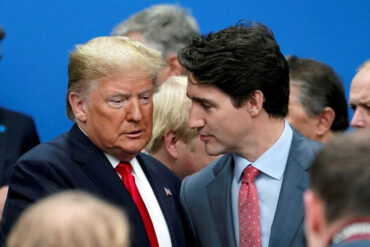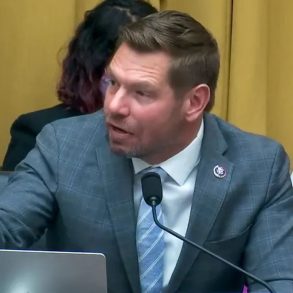President Donald Trump’s recent announcement of new tariffs on Canadian goods is a strategic and necessary step to reinforce America’s economic strength. The 25% tariffs, set to take effect this weekend, are not intended to ignite a prolonged trade war but rather to be a short-term measure that will ultimately lead to better trade agreements for the United States. With Prime Minister Justin Trudeau expressing his opposition, the Trump administration remains firm in its commitment to ensuring that American businesses and workers receive fair treatment in international trade.
What Are Trump’s Tariffs and When Do They Take Effect?
The Trump administration has confirmed that, starting Saturday, the U.S. will impose tariffs of 25% on imports from Canada and Mexico, while Chinese imports will face a 10% tariff. Canadian oil will receive a lower 10% tariff, which is expected to take effect on February 18. These tariffs are part of a larger effort to correct economic imbalances and ensure that American industries are not unfairly disadvantaged by foreign policies.
Trump has long advocated for better trade deals that prioritize American workers and businesses. “Look, Mexico and Canada have never been good to us on trade,” he said. “They’ve treated us very unfairly on trade, and we will be able to make that up very quickly because we don’t need the products that they have.”
Trump’s Vision: Strengthening the American Economy
The decision to impose tariffs is not about escalating tensions but about securing the best possible trade arrangements for the United States. Trump sees tariffs as a means to restore balance in trade relations that have long favored Canada and other trading partners.
“You see the power of the tariff,” Trump told reporters. “Nobody can compete with us because we have by far the biggest piggy bank.”
The White House has emphasized that these tariffs are a temporary strategy to bring Canada and Mexico to the negotiating table and address key concerns, including border security and illicit drug trafficking. White House Press Secretary Karoline Leavitt stated that the tariffs are in response to “the illegal fentanyl that they have sourced and allowed to distribute into our country, which has killed tens of millions of Americans.”
Which Canadian Products Are Getting Hit?
The tariffs will affect several major industries, including:
- Automobiles and auto parts – A key target, as this industry is deeply connected between the U.S. and Canada.
- Steel and aluminum – Sectors that have long faced unfair competition due to foreign subsidies.
- Consumer goods – Appliances, food items, and household products will see minor increases in cost.
- Oil exports – Canadian oil, already subject to pricing fluctuations, will be taxed at a lower 10% rate.
These tariffs are designed to be temporary and strategic, ensuring that U.S. businesses can compete on a level playing field without the long-term disruptions associated with traditional trade conflicts.
Impact on the Canadian Economy
Canada relies heavily on trade with the U.S., sending 75% of its exports south. The Canadian Chamber of Commerce warns that these tariffs could cause a temporary economic slowdown, but Trump’s administration believes this will be a necessary step toward a more equitable trade relationship.
The impact on Canadian GDP due to Trump’s tariffs was projected to be a 2.6% shrinkage, costing Canadian households an average of $1,900 annually, according to the Canadian Chamber of Commerce. Additionally, analysts at Oxford Economics predicted the loss of more than 150,000 Canadian jobs, with some provincial officials estimating even higher numbers.
Doug Ford, leader of the Progressive Conservative Party, acknowledged the significance of these changes. “The people of our province, like people across Canada, are facing unprecedented times,” he stated. “I am asking the people of Ontario for their trust. I’m asking … for a strong, stable, four-year mandate to do whatever it takes to protect Ontario.”
While Trudeau has voiced concerns, the Trump administration remains focused on its goal of securing better trade terms for American workers.
A Boost for the American Economy
These tariffs are expected to encourage more domestic production, strengthening American manufacturing and job creation. Some economists have warned of potential short-term price increases, but Trump has assured the public that these effects will be minimal and temporary.
Industries that depend on Canadian raw materials, such as steel and automotive manufacturing, will need to adapt, but the administration believes that long-term economic gains will far outweigh the initial adjustments.
What Is Trudeau Saying?
Prime Minister Trudeau has pushed back against the tariffs, stating, “We won’t back down… if tariffs are implemented against Canada, we will respond.” However, Trump’s administration remains confident that Canada will ultimately seek a compromise that benefits both nations.
Trudeau’s administration has announced an increase in border security investments, addressing one of Trump’s key concerns. Canada has pledged CDN$1.3 billion (US$90 million) toward improving border security, including new imaging tools, canine teams, and helicopters.
How Are Americans Reacting?
While some political opponents have criticized the tariffs, many Americans see them as a necessary step to correct years of unfair trade practices. Trump’s supporters believe these measures will lead to stronger economic growth and greater national security.
Senator Chris Coons (D-Del.) expressed concerns about potential cost increases, but the administration has assured the public that the tariffs are a temporary tool, not a permanent economic policy.
A Temporary Skirmish, Not a Trade War
While some critics have labeled this a trade war, Trump’s administration insists it is merely a short-term skirmish aimed at achieving a fairer trade environment. Key points of negotiation include:
- Stronger border security commitments – Addressing concerns about drug trafficking and illegal immigration.
- More favorable trade terms – Ensuring American industries are not unfairly disadvantaged.
- Temporary nature of the tariffs – Using them as leverage to secure better deals rather than maintaining them indefinitely.
NP Editor: We believe the tariffs will be fully implemented but short-lived. This may be a Trump strategy to show the world that he will implement tariffs even against one of America’s best friends, with the message that Trump will take on anyone at any time to further America’s interests. In fact, we believe that the resolution to this “skirmish” has already been determined, and perhaps was determined weeks ago.







